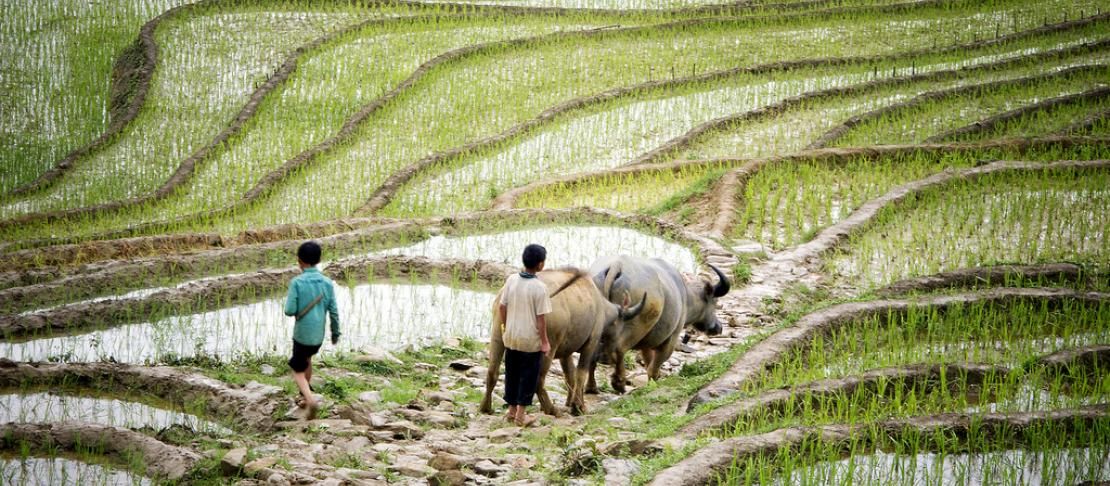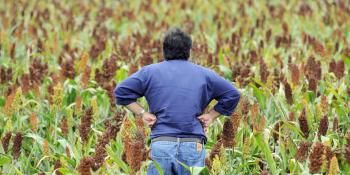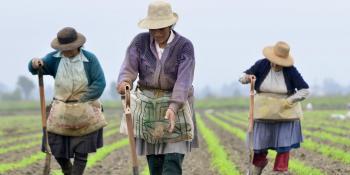Decision makers debate climate threats in Southeast Asia

Leading decision makers and researchers from Southeast Asia, one of CCAFS newest regions, will meet in Vietnam to debate how future climate, environmental, political and socio-economic factors could impact food security across the region.
Leading decision makers and researchers from Southeast Asia will meet in Vietnam to debate how future climate, environmental, political and socio-economic factors could impact food security across the region.
Experts will gather at the workshop from November 5-7, in Halong City, Vietnam, entitled: “Scenarios for Future Food Security, Environments and Livelihoods in Southeast Asia.” Currently targeting Cambodia, Lao and Vietnam, the initial phase of this global project will document changing factors likely to impact food security and increase vulnerability to climate change, with the intention of testing out future policy responses.
“When we think about climate change, we usually think about the weather – predictions based on how hot or cold the temperature will be,” said Dr. Leocadio Sebastian, CCAFS Regional Program Leader for Southeast Asia. “This workshop will try to capture the complex socio-cultural, economic undercurrent of factors – markets, governance, economic and infrastructure developments – in the region that will be crucial for food security and will also be impacted by climate change.”
- See more at: http://www.ciatnews.cgiar.org/2013/10/31/decision-makers-debate-climate…
Leading decision makers and researchers from Southeast Asia will meet in Vietnam to debate how future climate, environmental, political and socio-economic factors could impact food security across the region.
Experts will gather at the workshop from November 5-7, in Halong City, Vietnam, entitled: “Scenarios for Future Food Security, Environments and Livelihoods in Southeast Asia.” Currently targeting Cambodia, Lao and Vietnam, the initial phase of this global project will document changing factors likely to impact food security and increase vulnerability to climate change, with the intention of testing out future policy responses.
“When we think about climate change, we usually think about the weather – predictions based on how hot or cold the temperature will be,” said Dr. Leocadio Sebastian, CCAFS Regional Program Leader for Southeast Asia. “This workshop will try to capture the complex socio-cultural, economic undercurrent of factors – markets, governance, economic and infrastructure developments – in the region that will be crucial for food security and will also be impacted by climate change.”
- See more at: http://www.ciatnews.cgiar.org/2013/10/31/decision-makers-debate-climate…
Originally published on the CIAT blog
Experts will gather at the workshop from November 5-7, in Halong City, Vietnam, entitled: “Scenarios for Future Food Security, Environments and Livelihoods in Southeast Asia.” Currently targeting Cambodia, Lao and Vietnam, the initial phase of this global project will document changing factors likely to impact food security and increase vulnerability to climate change, with the intention of testing out future policy responses.
“When we think about climate change, we usually think about the weather – predictions based on how hot or cold the temperature will be,” said Dr. Leocadio Sebastian, CCAFS Regional Program Leader for Southeast Asia. “This workshop will try to capture the complex socio-cultural, economic undercurrent of factors – markets, governance, economic and infrastructure developments – in the region that will be crucial for food security and will also be impacted by climate change.”
Watch: using Scenarios in Southeast Asia
The CGIAR Research Program on Climate Change, Agriculture and Food Security (CCAFS), led by CIAT, is hosting the workshop with support from the Food and Agriculture Organization’s Economics and Policy Innovations for Climate-Smart Agriculture (EPIC) Project and the United Nations Environment Programme among other partners, using a set of climate scenarios projected to 2050 to capture different trajectories of socio-economic change.
Dr Joost Vervoort, Scenarios Officer for CCAFS, said: “This workshop will drive discussions around what happens in a world where complex factors – domestic and export market forces, political stability, social inequality, even national relationships – collide with climate change impacts, and what that could mean for future policy decisions around agriculture and food security in Southeast Asia.”
- See more at: http://www.ciatnews.cgiar.org/2013/10/31/decision-makers-debate-climate…
The CGIAR Research Program on Climate Change, Agriculture and Food Security (CCAFS), led by CIAT, is hosting the workshop with support from the Food and Agriculture Organization’s Economics and Policy Innovations for Climate-Smart Agriculture (EPIC) Project and the United Nations Environment Programme among other partners, using a set of climate scenarios projected to 2050 to capture different trajectories of socio-economic change.
Dr Joost Vervoort, Scenarios Officer for CCAFS, said: “This workshop will drive discussions around what happens in a world where complex factors – domestic and export market forces, political stability, social inequality, even national relationships – collide with climate change impacts, and what that could mean for future policy decisions around agriculture and food security in Southeast Asia.”
Read the rest of this story on the CIAT blog.
Read: CGIAR R4D collaboration for climate change in Southeast Asia: report of convergence meeting
Learn more about what we are doing in Southeast Asia and the upcoming workshop:
- The world in 2050: on the front line
- Thinking outside the box on climate change
- Looking for clues to navigate climate uncertainty
Georgina Smith works with communications for CIAT Southeast Asia.



